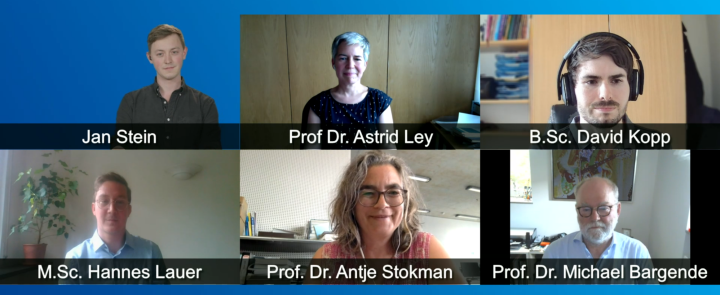The team of the new Green Office includes the two sustainability managers Dr. Elif Köksoy and Dr. Brigitte Lorenz as well as Dr. Charlotte Toulouse, personal assistant to the Vice Rector for Research. The team closely cooperates with Mobility Manager Laura Schlowak, Energy Manager Harald Hentze, and maybe soon with you. Because that is the idea behind the Green Office: that it is supported by the commitment of the staff and students of the university.
Sustainability Manager Elif Köksoy comes from an environmental research background, having previously worked as a geomicrobiologist at the Leibniz Institute DSMZ (Braunschweig, Germany), the Bigelow Laboratory for Ocean Sciences (Maine, USA), and the University of Tübingen. She knows how challenging it can be to incorporate sustainability into research activities.
Before joining the Green Office, Brigitte Lorenz co-developed the sustainability strategy at the High Performance Computing Center (HLRS) and was instrumental in introducing and maintaining an environmental management system according to EMAS [de] (Eco Management and Audit Scheme). She has also worked on topics such as waste concepts, sustainable procurement, and supply chain management and would like to contribute her expertise to the Green Office. Information on sustainability at HLRS.
As an advisor to the Vice Rector for Research, Charlotte Toulouse is the interface to the university management and helps strategically anchor and integrate the Green Office. There is a link to the Climate Round Table, which was formed in 2020 as an advisory body consisting of various initiatives, interested students, and employees.
The new mobility manager Laura Schlowak contributes towards structurally incorporating and institutionalizing sustainability concerns at the University of Stuttgart, which play an important role in the new SEPUS in particular. Some important objectives from the University include the car-free campus and achieving climate neutrality by 2035, which is set to be achieved as part of the flagship project MobiLab.
Harald Hentze is an energy manager at the University of Stuttgart. It has never been more important to act in an energy-conscious and resource-saving manner than it is today. Therefore, the University of Stuttgart is using an end-to-end energy management system to increase energy efficiency. This continuously reduces energy consumption and energy costs.
The team will be strengthened by five student employees in late summer. Student volunteers can receive ECTS credit through project work. The offer of key-competencies for students is also being considered.
“We want to use the Green Office to establish a strong culture of sustainability at the university,” explains Elif Köksoy. “We are collecting ideas for sustainability projects that can act as catalysts for this process. Initial proposals and ideas – many of which involve waste management, sustainable green spaces, and resource (e.g., paper) conservation – have already been submitted to the Green Office. We then offer advice, check the feasibility, look for other supporters, bring together various actors, and plan events,” says the sustainability manager. “But first and foremost, our goal is to help those interested in sustainability implement their project ideas independently and network them with the right people. We can thus ensure that various sustainability projects – led by university employees themselves – are launched on campus. The Green Office is in regular exchange with the sustainability department of stuvus [de]. The team collaborates on concepts for anchoring a strong culture of sustainability on the university campus.
“We want to be the first point of contact for best practices and the interface of an interdisciplinary network and think tank.” As a beacon for sustainability issues, the Green Office bears responsibility for the sustainable development of the University of Stuttgart. Köksoy explains: “We would also like to address teaching and make student and interested citizens aware of their responsibility for sustainable development.”
We can’t make a difference without the actors and the commitment of many.
Elif Köksoy
Enter Dialogs
In order to enter dialogs with interested members of the university and external parties, the Green Office offers various platforms (e.g., the initially virtual Lunch and Chat event), which enable people to get to know each other and discuss a wide range of sustainability topics in a relaxed setting.
Lunch and Chat at noon on the first Friday of every month.
Next date: September 3, 2021, noon–1:00 p.m., in person or on Webex
Students’ initiative welcomed by the university administration
The idea for the Green Office originated with the students. In the Netherlands, comparable institutions have existed at universities for a number of years. Charlotte Toulouse explains: “Students are highly engaged; the issue of sustainability in higher education is important to them. They had a desire to structurally anchor this at the university.” The university administration was open to the initiative from the very beginning. There was a strategy dialog on this as part of the Excellence Strategy, and the topic was included in the current structure and development plan (SEPUS). At the end of 2020, the Green Office acquired THE SCHAUFLER FOUNDATION as a sponsor.
Kick-off event
At the kick-off, the team introduced itself and its future tasks. A keynote presentation compared the impacts of climate change in Stuttgart and the Philippine capital Manila. In a panel discussion, participants talked about the role of the University of Stuttgart, research, and teaching with regard to climate change: What tasks do we have to take on? Where do our responsibilities lie? And are we on the right track? The team was quite pleased with the response at the kick-off. “We had a mixed audience: students, employees, and external parties, some from other universities, were there,” says Köksoy.
We are responsible for what we do and what we don’t do. We want to bear responsibility.
Rector Prof. Wolfram Ressel
“We have set ourselves ambitious goals,” explained Rector Prof. Wolfram Ressel in his welcome address. “We want to be a climate-neutral university by 2035. We are already involved with projects such as MobiLab and Campus hoch i as well as intelligent, sustainable building use. We need the will to change. Let’s go forward together!”
Effects of climate change in Stuttgart and Manila
In his keynote speech, Hannes Lauer, PhD student at the Institute of Regional Development Planning (IREUS), presented examples of the consequences of climate change that are visible in Stuttgart and in Manila and that can be expected in the future. In Stuttgart, particulate matter and very hot summers; in Manila, storms and floods. Citizens are already being resettled as a preventive measure. But in the new settlements, people lack social anchors and the ability to reach their jobs in the city.
Panel discussion on the role of science and education with regard to climate change

The panelists agreed that we at the university can initiate change and have a responsibility to contribute. “We live in a part of the world where we can afford to do important research. We should export products that help protect the climate,” explains Prof. Michael Bargende. David Kopp emphasizes that teaching is also an important element: “The university is where the decision-makers of tomorrow are trained. Universities should be places of transformation; here we can try out how it can work.” There was also consensus that social involvement and participation are just as important as all stakeholders and global partners being on as equal terms. In response to the question “Are we on the right track in Germany?”, the participants gave different assessments. According to Prof. Astrid Ley, the awareness is there – but implementation is often still lacking. Prof. Antje Stokman raised concerns that the higher efficiency of many technologies has so far been eaten up by growth. Hannes Lauer also explained that it was still a difficult road ahead: “It’s sometimes hard to get things moving. It can be fun, but measures can also be uncomfortable or inconvenient. So they have to be supported by everyone. That’s where the Green Office comes in.”
Green Office forms interface to other projects
“Una Terra” – in the sister format of the university’s internal funding program Terra Incognita, this call for tender is about dormant potential and ideas in the context of sustainability. A networking event of all projects is planned as part of the Green Office.
CampUS hoch i [de] – A real-world laboratory for climate protection and climate neutrality at the University of Stuttgart
Cycling for the climate – The University of Stuttgart will be taking part in the STADTRADELN campaign.







